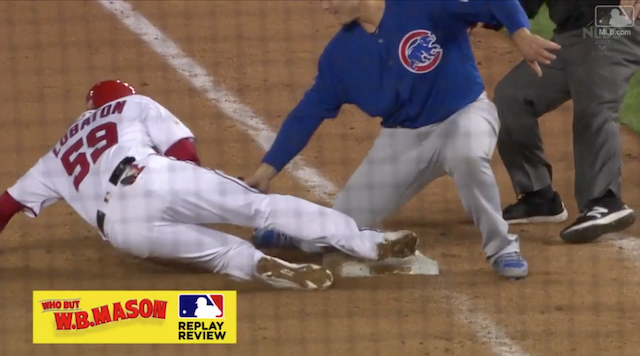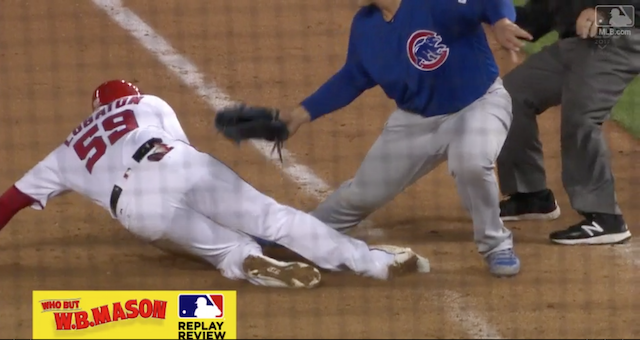

All Your Perfect Imperfections
By: Emma Baccellieri
It has now been exactly one week, give or take a few hours, since this play:



Jose Lobaton beat the tag. He was safe. And then, upon further examination, he was discovered to have beat the tag but to have lifted his foot up off the base ever so slightly while the tag was still being applied. He was out. The call was replayed, reviewed, reversed. In theory, this is the replay system at its best—able to demand perfection at the most granular level. In practice, this sucks.
The revised call was good only insofar as it was right, and it was only right in the most technical sense of the concept. This is the perfection that replay can provide: the chance to rip any given play apart at the seams in order to examine its individual frames in isolation under a microscope and scrutinize them for potential violations. It’s ruthless. It’s a kind of viciousness that is almost at odds with the smoothly flawless result that it’s meant to produce. Perfection, as a general concept, is usually characterized as a state that’s peaceful and paradise-like and free from anything so intense as this kind of surveillance. But no matter the form, perfection always has a high cost. If paradise is something to be cultivated rather than naturally found, how does one create it other than with this sort of cutting and freezing and painfully deep nitpicking?
A simplistic definition of perfect is good taken to the extreme. But “good” as the absence of bad—as the absence of flaws—does not necessarily bear a strong resemblance to moral good or aesthetic good or any good that people generally value, really, except for the barest and most technical sort. Perfection must involve good; it just doesn’t have to be good. And so getting every single call right involves being good on every single call. But there is not so much that’s necessarily good in what’s required to be right.
Here is a passage from Thomas Aquinas’s Summa Theologica:
But goodness signifies perfection which is desirable; and consequently of ultimate perfection. Hence that which has ultimate perfection is said to be simply good; but that which has not the ultimate perfection it ought to have (although, in so far as it is at all actual, it has some perfection), is not said to be perfect simply nor good simply, but only relatively.
For Aquinas, divine perfection exists on a level unachievable in any other form. Perfection isn’t an absolute state that one either has or does not. Man, for instance, can have some level of perfection. He just can’t be perfect, and that’s fine. So replay review, too, represents perfection that’s unachievable by any other form baseball has to offer—but perfection based in righteousness rather than goodness, maybe, isn’t really necessarily so good at all.

A Letter
By: Matt Ellis
/100101001100100010101011100010101110010 /.exe.script.generate <tr> <td> : define.text.signal:
My dearest, Marthx―
It is cold on Mars. I often think about our winter views from our Svalbard apartment and the brisk 78-degree winters we shared there. I miss them, under the dim reflected light of Phobos. Its face shines back at me the same light that I know is touching your face now. I think, somehow, there is a part of you, there, waiting to find me.
I saw the game. Yes, I was made aware of the result before the images were sent through radio waves―I swear, I can’t decide if this new transductive biochemical communications apparatus they’ve stitched into the walls is worth it or not, but at least it helped dull the senses like that artificial piss-colored whiskey from Mickey’s used to. I wish I could have watched it there with you, in the deep room. Christine’s throw home would have looked incredible projected on a horizontal axis, what with the smoke and all.
My supervisor is a Yankees fan―can you believe it?!? I ribbed him when he tried to complain about how hard these past 70 years have been, and I reminded him of how many numbers they retired, that stupid run they went on in 2017, the Aaron Judge statue outside Neuralink Park. That series against Caracas back in March should have been a sign to rebuild, but you know what happens with the inflated budgets these days. Geez, sometimes I miss when we had a stable object in power we could use to rally protest against… but I suppose that has actually never been the case, has it?
Anyway, let me know if you want to come up this weekend. I know you’re still sad about the Nats, but you have to know that the law of averages means that it’s going to happen eventually, it just will. I promise not to talk about the Reds too much… I realize how lucky I am to be watching a team at the height of their ability, despite the fact it’s all on a video delay from 34 million miles away. You would think they knew how to fix that after building this facility 60 years ago, but then again, these are the people who want jersey sponsorships for some insane reason.
See you soon,
Julix
/000101100010 /.exe.send.endtransmission

In Play, Run(s)
By: Rachael McDaniel
I am a full-time undergrad student, and I live three bus rides away from my university campus. Once September rolls around, the overwhelming majority of my time on any given weekday is spent either standing at bus stops, sitting in class, or sitting on the bus.
Given that I’m in Pacific time, this means watching a lot of important September and October baseball games is out of the question. While I am perfectly ready to cut class for baseball if my beloved Blue Jays are in the postseason―I skipped a class where the penalty for unexcused absence was a 3 percent grade deduction to watch the 2016 AL Wild Card game, and it was absolutely worth it―that is not the case this year.
So lately I have had to become a connoisseur of alternative means of baseball consumption. My favorite is, of course, a portable radio, but I live in Canada: When hockey season starts, it can be hard to find any stations broadcasting baseball at all, particularly not non–Blue Jays baseball. And, regardless, I’m not about to sit in class listening to a radio.
In lieu of the radio’s dulcet tones, then, I am forced to follow games on the At Bat Gameday feed. It definitely doesn’t hold a candle to the radio or TV experience: The strike zone is often inaccurate, you are at the mercy of your internet connection and the feed’s frequent lagginess, and on occasion the narrative will splinter into alternate reality, fabricating grand slams and ejection Statcast numbers.
There is one aspect of this kind of mediated baseball-viewing experience, though, which I love:
In play, run(s)
Particularly if there are runners on base, the appearance of those three words signifies a fundamental change in the state of the game, the beginning of a new reality from which there can be no return―but it is a new reality that is as yet unknown, that has not yet made itself manifest fully, that both does and does not exist. We know that the ball was put in play; we know that at least one run scored. But how many runs? How did it happen? Was it a moon shot slammed to the upper deck, a misplayed bunt attempt, a seeing-eye single? Was an out recorded on the play? Was a bat flipped, a curse yelled? “In play, run(s)” is a strange, almost magical space, a space on the threshold of becoming.
There are times when being immersed in the familiar flow of a baseball game can lull you into a kind of tranquil numbness. You can tune out for a while, attend to other concerns, because you know that the voice of the broadcasters will draw you back if anything important happens. But when you are sitting in class or on the bus, sneaking glances at your phone, and the pitcher’s in a jam with two outs, and you see those three words?
It is an instant of clear, absolute focus. Everything centers around the unseen ball in play, the unseen run(s), the myriad other variables whose status remains uncertain. You desperately refresh the page, as 10 different run-scoring scenarios, all more dramatic than the last, spring to life in your mind’s eye. And in a time when so many of us are so cynical about everything, including this sport we spend so much time deconstructing, I treasure these moments, moments when anything really could have happened in baseball, and really, anything already has.
Thank you for reading
This is a free article. If you enjoyed it, consider subscribing to Baseball Prospectus. Subscriptions support ongoing public baseball research and analysis in an increasingly proprietary environment.
Subscribe now